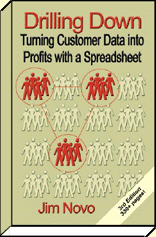New RFM: Customer Value Scoring
Drilling Down
Newsletter
# 43: 3/2004
Drilling Down - Turning Customer
Data into Profits with a Spreadsheet
*************************
Customer Valuation, Retention,
Loyalty, Defection
Get the Drilling Down Book!
http://www.booklocker.com/jimnovo
Prior Newsletters:
http://www.jimnovo.com/newsletters.htm
========================
In This Issue:
# Topics Overview
# Best Customer Retention Articles
# Question - New RFM: Customer Perks?
# Question - New RFM: Interaction Scores?
# New RFM Metrics: Take 10 on Retention
--------------------
Topics Overview
Hi again folks, Jim Novo here.
We're a little light on customer retention
article links this month, with only one I thought worth the
read. But to make up for it, we have two excellent
"CRM" style questions from fellow Drillers. If you're
wrestling with customer segmentation issues, you might want to give
these two questions a read.
But first, these two jobs are still open for you web
analytics mavens:
Drs.
Foster & Smith, Wisconsin
Karta, Los Angeles
If you have a job in web metrics / customer analysis you'd like to get
to this newsletter audience of about 4,000 send me a link. No charge to promote your analytics job.
Second, the free Website Conversion and Web Analytics Suite of Calculators is now available
in business Spanish, courtesy of the bi-lingual folks at Future Now; click
here.
OK, now let's do some Drillin!
Best Customer Retention Articles
====================
This section flags "must read" articles moving into the paid archives
of trade magazines before the next newsletter is delivered.
If you don't read these articles by the date listed, you will have to pay
the magazine to read them from the online archives.
Note to web
site visitors: These links may
have expired by the time you read
this. You
can get these "must read" links e-mailed to
you
every 2 weeks before they expire by subscribing to the newsletter.
*** Halt Customer Defection
March 31, 2004 Target Marketing
This is a well-outlined and argued support of customer
retention marketing, the kind of thing you would get your boss to read if he
/ she just doesn't "get it". But it's short on the "how
to", though you don't have to go far to find out exactly
what to do.
Questions from Fellow Drillers
=====================
If you don't know what RFM is or how it can be used to drive customer profitability in just about any business,
click
here.
New RFM: Promoting Customer Perks
Q: Jim, do you have an opinion on overt versus
covert customer benefits? What I meant by overt vs. covert...
have you seen clients do programs where they TOLD their customers they
are a valued (Gold, Platinum) customer and provided tangible benefits,
vs. others who have just covertly treated these customers specially in
some way (i.e. priority routing, better reps, thank you calls, etc.)
A: Well, a program won't be very effective if everything
is completely covert. I mean, it's nice to get great service and
that certainly contributes to customer retention, but recognition is
much more powerful. The customer needs to know they are being
treated specially at some level.
Something like call routing is a good example. If a customer
is getting priority call routing and they don't know it, they may
think the service is good. If you tell them they are going to
get it and then they get it, it's an entitlement they earned.
More powerful, and more effective in keeping the customer. Let's
say they are thinking of defecting. If they don't know they are
getting priority routing, they could suspect the service might be as
good at the competition. If they know they are getting priority
routing, the question becomes "Does the other guy do this to?
And if so, will he give it to me?" See what I mean?
It's much more powerful for the customer to know they are getting
special treatment than not to know.
Generally, a "surprise and delight" approach or
philosophy is the most effective and highest ROI way to treat
customers. Putting them in a program where they know all the
benefits, aka "Gold Member" is fine, and may be a surprise
and delight the *first* time, but wears out. If you go
with a program like that you have to constantly refresh it and add
benefits to it or it gets stale. This is what happens to most
loyalty programs. Have you read my case study on loyalty?
This program was about as "anti-stale" as you can get.
252% ROI in the cell phone business, about as tough a biz for loyalty
as you can get. If you want to read the case study, click
here.
But you can do surprise and delight as one-off ideas, they don't
have to be "programs"; it's the timing that is critical.
You want to do the events near life-cycle events. Certainly the
first one is the initial order - what is in the box, how is it packed,
how easy is it to put together, etc. After that, things like
just calling a customer to tell them you appreciate their biz,
sometimes silly stuff like "1st purchase anniversary" cards
- which can also be used to smoke out customer service / product
problems - are effective. Anything you think will "surprise
and delight" the customer. Use control groups and look for
lift in sales or a slowing of defection, just like you would with any
direct marketing program. If you can synch these promotions to
known LifeCycle issues, all the better, because your marketing
actually surprises and delights the customer.
For example, lets say you have a segment of top 20%, very
valuable customers. You notice there is a pattern, probably Latency
or Recency based, in this type of
customer. So you anticipate and make some kind of offer which
really lines up they what he would do anyway - but with a twist.
Say people in this segment typically upgrade service 6 months after
initial purchase. You anticipate this and send a promotion that
says "if you upgrade XXX to ZZZ you can also add this related
service or product for 25% off". This way you don't
subsidize the planned purchase, but you augment with related service /
products and drive the transaction ticket higher. Or you give
something really soft, like extending the warranty or months of
service by a year if they upgrade - but they have to upgrade to a
higher level than what is normal for the segment.
Surprise and
delight - for the customer. Not for you, because you knew
the upgrade was going to happen anyway, you made it a surprise and
delight for the customer - and made a couple bucks at the same time.
Jim
-------------------------------
If you are a consultant, agency, or software developer with clients
needing action-oriented customer intelligence or High ROI Customer
Marketing program designs, click
here.
-------------------------------
New RFM: Customer Interaction Scores
Q: We were preparing customer profiles for our company
and I happened to search your website. Is there any format that
we could follow? Please let me know. We need to prepare
profiles that will speak to / show / identify the nature of a customer
at a glance and that all employees can relate to.
A: Well, that's a pretty broad question and difficult
to answer without more information. Assuming the reason you want
this "employees can identify the nature of a customer at a
glance" profile is so you can
differentiate the profitability of customers and potentially treat
them differently based on this profile, I would use a 2-digit score,
based on Value to Date and Potential or Future Value. This
allows you to hide the actual data from employees but provides a very
specific view of the Current and Future value of the customer.
For example, take your customers and sort them by Total Sales, Net
Profit, Number of Visits / Downloads, or whatever Current Value
financial metric you have. The top 20% of customers get a score
of 5, the 2nd 20% get a score of 4, etc, down to the bottom 20% who
get a 1. This is the first digit of the 2-digit score and
represents Current Value.
Create the second digit of the score using a Potential Value metric
you feel is appropriate, probably something to do with either Recency
or Latency. Generally,
this would involve the amount of time that has passed since the
last event contributing to the current profitability metric
created above - Total Sales, Net Profit, Number of Visits / Downloads,
etc. If you are using Total Sales, it would be Days since last
Sale. If you are using Number of Visits, it would be Days since
Last Visit.
Then sort and score customers as above. For example, last
event less than 30 days ago gets a 5, last event 61 - 90 days ago gets
a 4, last event 91 - 120 days ago gets a 3, etc. This
score represents the Potential Value of the customer. The lower
this Potential Value number, the less likely it is the customer is
going to engage in profit generating activity or events in the future.
A customer with a 55 score is a very best customer, they have high
current value and high potential value. A customer with a 52 is
a current best customer with low likelihood to create value in
the future - a customer who is defecting. A score of 35 is a
customer with medium current value but high potential value - an
"up and coming" best customer. You can establish
interaction rules for employees based on these scores and manage
customer relationships based on the scores. For example, an
employee interacting with a 52 customer (defecting best customer)
might be given the authority to grant special discounts or otherwise
treat this customer uniquely. Likewise, a database with these
scores available can drive automated interactions and customized
content on a web site.
Jim
-------------------
If you are in SEO and the client isn't converting the additional
visitors you generate, you can help them make it happen - click here.
-------------------
New RFM Metrics: Take 10 on Retention
====================
If you would like to know more about how to use the new RFM metrics to improve your profitability on the web, check out the free "Take 10 on Retention"
package I wrote. It includes a 10 minute presentation on the strategy and
reporting behind increasing web customer ROI using simple predictive
models.
Here's the idea in a nutshell: when you make investments, you
expect the value of them to rise in the future. You have web
investment choices - media buys, ad designs, building out content,
etc. Retention metrics tell you which of these investments are
the most likely to generate increased profits in the future.
Click here for the Take 10 on Retention
-------------------------------
That's it for this month's edition of the Drilling Down newsletter.
If you like the newsletter, please forward it to a friend! Subscription instructions are top and bottom of this page.
Any comments on the newsletter (it's too long, too short, topic
suggestions, etc.) please send them right along to me, along with any
other questions on customer Valuation, Retention, Loyalty, and
Defection here.
'Til next time, keep Drilling Down!
- Jim Novo
Copyright 2004, The Drilling Down Project by Jim Novo. All
rights reserved. You are free to use material from this
newsletter in whole or in part as long as you include complete
attribution, including live web site link and/or e-mail link. Please
tell me where & when the material will appear.
| 
![]()
